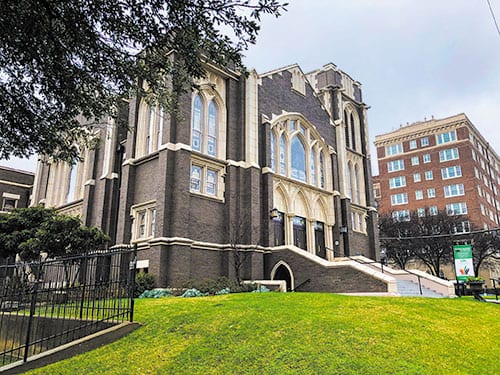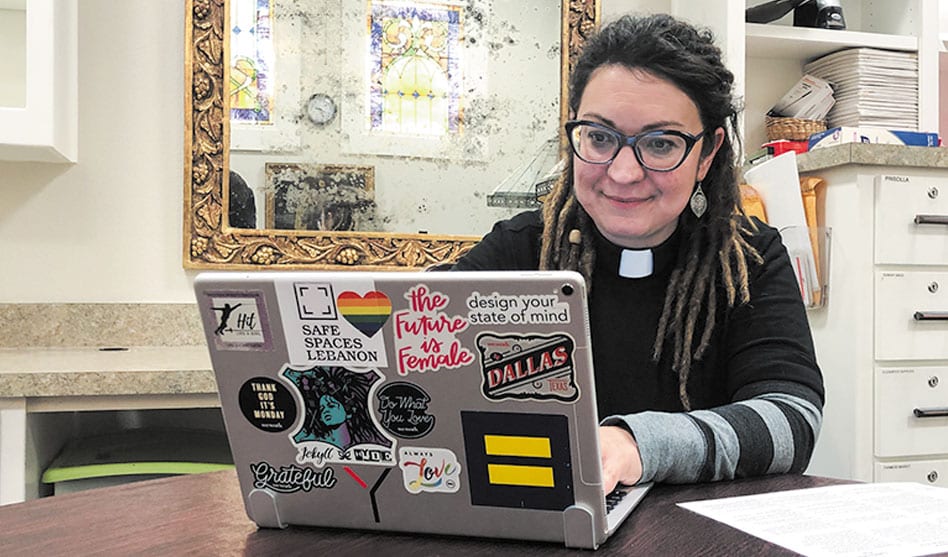The Rev. Rachel Baughman of Oak Lawn United Methodist Church.
Nick Totin | Contributing Writer
nick@nicktotin.com
The United Methodist Church’s General Conference, the church’s global governing body, is meeting Feb. 23-26, in St. Louis, Mo., for a special session to take steps towards acceptance and inclusion of LGBTQ people. The session will include decisions on whether to allow an openly-gay person to be ordained as a minister, whether to allow churches to hold and pastors to officiate at same-sex weddings, and how to reference homosexualitiy in the Book of Discipline, the church’s governing text.
Conference representatives will have multiple options on how to move forward as a church regarding the LGBTQ community. The options have been developed by the Commission on a Way Forward (COWF) as a result of the church reaching an impasse on the issue during the most recent meeting of the general conference in 2016.
Currently the Book of Discipline states, “The practice of homosexuality is incompatible with Christian teaching.” Methodist ministers, therefore, are forbidden from officiating at weddings between same-sex couples, and if they do they are subject to disciplinary action, including being forced to surrender their ordination credentials. Churches cannot hold same-sex wedding ceremonies.
This decree in the Book of Discipline also means that openly-gay individuals cannot be ordained by the church.

Oak Lawn United Methodist Church
The COWF will present options at the special conference for a new approach to all aspects of current church governance.
Some UMC congregations are part of the Reconciling Ministries Network, which invites individual congregations to take a stand against the churches shutout of LGBTQ people. It was developed in 1984, the same year the General Conference voted to amend the Book of Discipline to state that “no self-avowed, practicing homosexual shall be ordained or appointed in the United Methodist Church.”
Dallas currently has 10 churches in the network that openly welcome LGBTQ people, and there are more than 25 such churches in the DFW metroplex.
The Rev. Rachel Baughman is head pastor of one of those churches, Oak Lawn UMC, located at in the heart of Dallas’ gayborhood, at the intersection of Oak Lawn Avenue and Cedar Springs Road.
Baughman believes the only path to effective ministry is to be involved in the community and understand the context of the people that make up the area she serves. She has helped lead the effort for inclusion in Dallas in her role with a group called Faith Forward Dallas at Thanksgiving Square, an interfaith group that works for compassion and justice.
Baughman is also a key leader in the same efforts within the United Methodist Church in an organizing group called Uniting Methodists.
“It’s frustrating when we’re presented with the idea that a person with progressive beliefs cannot, at the same time, have respect for biblical authority,” Baughman said.
Four plans will be presented at the General Conference beginning Saturday. One plan seeks to further the restrictive language, disallowing UMC to have any ministering relationship with the LGBTQ community. This plan, known as the Traditional Plan, would, if adopted by the body, maintain the blanket prohibition on LGBTQ clergy and weddings. Bishops and clergy would be required to pledge their allegiance to the ban, creating a mandatory reporting rule for witnessing clergy who break with the Discipline.
The Traditional Plan would give every individual church congregation the option to vote to leave the church and operate independently with no affiliation with UMC. The “gracious exit” process could then involve months of work to determine ownership of the church property and what the church might still owe to its former governing bodies.
In stark contrast, the Simple Plan would create a blanket inclusion and acceptance policy, making the entire UMC open and welcoming to the LGBTQ community. It would remove all restrictions on openly-gay people being ordained as clergy, and clergy would be allowed to perform same-sex weddings. Churches and clergy still retain their individual right to choose whether or not to be inclusive.
According to UMC News, the Council of Bishops is recommending the One Church Plan, which would allow conferences (regional groups of churches), churches and pastors the option to align with their personal beliefs on human sexuality while remaining a member of the global church organization.
Each individual church would be allowed to make its own decision on whether to allow same-sex weddings, and each conference would decide whether or not they would ordain openly-gay ministers, giving ministers the choice to join a conference that aligns with their personal views.
The church also has an option to alter the church constitution through several amendments, creating sweeping separations between three new governing church bodies.
The Connectional Conference Plan would cause the geographical jurisdictions to be redrawn to support three separate bodies: Progressive, Traditional and Unity. Each group would use a general Book of Discipline but be allowed to adopt a revised version of sections relating to homosexuality.
This process is also the most lengthy option to implement, with plans taking as long as six years to complete. Baughman believes this plan is not only unrealistic, but that it could cause problems during this month’s conference.
“The [Connectional Conference Plan] and the Simple Plan may draw votes away from the [One Church Plan], which is the most viable plan for how we can remain together as one church,” Baughman said.
A major sticking point in the decision is the global nature of the church and its presence in countries where homosexuality is illegal.
“The question is, ‘Can we continue to be a one church denomination [that] allows us to have ministry in Liberia and the Philippines and in Europe and in the United States?’” Bishop Kenneth H. Carter Jr., president of the Council of Bishops, said in a UMC News article.
Baughman faced criticism from progressives within the denomination for supporting the One Church Plan rather than the Simple Plan, from individuals that believe the One Church Plan does not go far enough.
“My support of the LGBTQ community was questioned,” Baughman acknowledged. But, she stressed, “the OCP allows us to stay in conversation with one another. If we close the door on the relationship, we close door on change.”
According to the Rev. Forbes Matonga, pastor-in-charge at Nyadire Mission Centre in Zimbabwe, most African countries favor the Traditional Plan. “Any plan that proposes to authorize the practice of homosexuality either explicitly or discretely is unacceptable to us,” he said.
The conference will spend the first full day of the meeting choosing one plan to consider, followed by two days of debate before a vote is taken by the body. The decision may be revisited during the regular meeting of UMC General Conference in May 2020.
Nick Totin is a writer covering LGBTQ issues and lifestyle, and as a marketing consultant in Dallas. He has previously worked with a UMC annual conference in Pennsylvania before moving to Texas.












